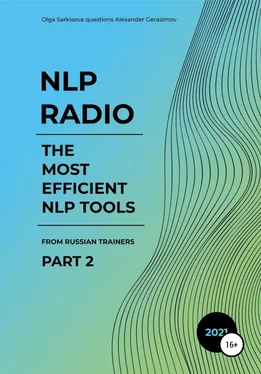Yes, we can tell a person about a project, putting emphasis exactly on taking hazards into account. ‘We have got that covered, we have taken it into consideration, we have resolved that, we will plan it in more detail.’ And that person will feel more comfortable in our presence.
And he or she will pick us, if it refers to a business proposal.
We can also use it, for example, for the purpose of self-therapy and diagnostics. You surely understand that the most critical thing in our life is balance. Not to tilt toward a specific metaprogram, but exactly to choose… depending on the context we are currently in.
If it is, for example, the context of health, it would be logically… well, the idea of health is rather the idea of avoiding problems, of preventing
diseases. Because… for example the World Health Organization doesn’t have a definition of a healthy person. Everything is defined through the absence: there is no specific disease, there are no specific symptoms. …So, in order to find a healthy person… Without knowing how to do it. They haven’t set a goal, so they don’t reach it, probably.
In order to understand… whether or not you have balance, whether or not you can be adequate in this context. It is also important. It is critical to know, it is critical to understand ourselves.
Yes. So, when we know ourselves, it means that we can change
ourselves. Right? So, very logical. Because when we don’t realize
something, it guides us, as you always say. We are in the power
of what we cannot realize. So, once we realize it, we can change
it. I believe. Even metaprograms can be changed.
To be more precise, it is not about changing, but rather about shaking them up. And balancing. If a person has only FROM, and has no TOWARDS programs, we can gently move – while practicing
– toward TOWARDS. To intentionally outline goals. To implement the WFO technique we’ve practiced. Actually, the WFO technique partially addresses metaprograms. For example, Step Number One – setting a goal – corresponds to TOWARDS motivation. While Ecology – Step Number Five – corresponds to FROM motivation. And we should put emphasis exactly on what we really want. In order to balance out…
Working with fears also I believe.
Accounting fears.
Work with our fears in order to change this metaprogram.
In psychotherapy? Right?
Yes.
So, using all those tools and instruments, it would be a great
idea for a business owner or a company manager who keeps
a few employees to manage those employees knowing their
metaprograms. Right? Have you ever practiced that? What is your
experience with that?
Yes… I consider this information – about metaprograms – to be very
important, very important for distinguishing the type of personality.
First of all, if you have for a long time been with a person, for example, in a working context, you can understand what kind of person he or she is based on their combination of metaprograms. Let us pretend that you have a list of occupations and job positions available at your company, including corresponding metaprograms. For example, FROM and TOWARDS. …And you know, that Accountant rather refers to FROM, Sales Representative rather refers to TOWARDS, Office-Cleaner – let it be FROM, and, for example, Chief Commercial Officer refers to both FROM and TOWARDS. And during personnel recruiting, or while interacting with already existing employees, you can understand how much a person matches his or her job.
Because some people, in spite of their character traits, tear themselves literally apart… While personnel reshuffle could be enough… to let people do their own thing… for example, if a person likes accounting risks, but is delegated to achieve a breakthrough, to move ahead, such person feels pretty uncomfortable. So, let us pretend that you have compiled a list of metaprograms – Occupations, which…
available Job Positions… And you analyze people. And you will realize at once how comfortable a person feels while performing a certain job. As an example.
Yes. It is a great tool in NLP. Alexander, I think that you have
awoken interest to other metaprograms. Now we have understood,
how useful it is, what great a tool it is.
Thank you, Alexander.
Thank you, Olga. I also would like to ask our listeners to tell us in their comments about their metaprogram ratio, and which program prevails… Within the 1-100% range. It could it an 80% of TOWARDS
to 20% of FROM ratio, or vice versa… 30% of TOWARDS
to 70% of FROM… or 100% of TOWARDS… How do you think, what kind of person are you? And using which parameters can you define it?
I’m sure while you were listening to this podcast you already got
it in yourself. So, please write. Bye!
CHAPTER 2
METAPROGRAMS.
ACTIVE VS REFLECTIVE
Hello, everyone! And again this is NLP radio on stream. Today
in our studio we are having our usual guest – a famous NLP trainer
in Russia, a professional negotiator, Alexander Gerasimov. Hello,
Alexander. Thanks for being with us.
Hello, Olga. Hello, everybody.
Today we continue talking about metaprograms. Last time
we discussed motivation “to” and “from” and today we continue
talking it over. We will highlight reflective and active types of people.
Would you introduce it, Alexander, what is this?
Those are our certain character traits. As you know, there are people who cannot sit idle, they are super-active, proactive, and so on… who first do something and then think about it… and there are people, who first think… Measure Twice, Cut Once… there is such proverb…
meaning that such people first weigh everything, calculate everything, and only then… slowly but steadily… they commence, for example, achieving a goal…
We didn’t know, that that was called metaprograms. Okay.
So, how do we identify it in people actually? We are watching
them. We observe them, of course. But are there any tests
to understand it?
Unlike the FROM/TOWARDS metaprogram we discussed in our previous podcast… everything is a little bit simpler in this case… more noticeable… A person having ACTIVE metaprogram literally cannot sit idle… Such person starts talking even before you have finished… they can easily interrupt you when you speak… for example… such person types messages faster… for example, you have just sent a message to such person, and they have immediately replied… such person… as soon as a decision is made… jumps up and starts implementing it… or
even starts doing something before a final decision is made… I often see this picture at trainings, when I explain an exercise… there are people, who immediately jump up and commence doing it… and there are reflective people… it is critical to them to ask all questions, to take everything possible into consideration… to think, to look around, to weigh everything… sometimes to note down… to take into account some other nuances… to ask questions once again… and keep sitting, contemplating… philosophizing… Not that it’s critical to them to avoid doing something… they also do… but they need certain preparation… when they do something, they do it one step at a time.
Читать дальше












